ADJECTIVE CLAUSE
adjective clauses practice

定语从句1.我希望有一份可以赚很多钱的工作。
2.一些常看电影的人不喜欢情节过于简单的电影。
3.我希望和一个文化背景与我不同的人一起住。
4.我不想成为轻视他人的傲慢的人。
(arrogant)5.有一些孩子他们的父母亲太忙没能照顾他们。
6.养宠物的人通常都是善良的。
7.Billy 没去上学的原因还不知道。
8.推荐学生看一些作者还活着的书。
(recommend)9.将近一半来参加会议的人都是没被邀请的人。
10.一些人想搬去一个没有法律的国家。
1.I hope to have a job where I can earn a lot of money.2.Some moviegoers do not like a movie whose story is too simple. 3.I wish to live with a person whose cultural background is different from mine.4.I don’t want to become an arrogant person who looks down on others.5.There are some children whose parents are too busy to take care of them.6.People who have pets are usually kind.7.The reason why Billy was absent from school is not known yet. 8.Students are recommended to read books of which authors are still alive.9.Almost half of the people who attended the meeting were not invited.10.Some people wish to move to a country in which they can live without laws.。
英语从句知识点总结
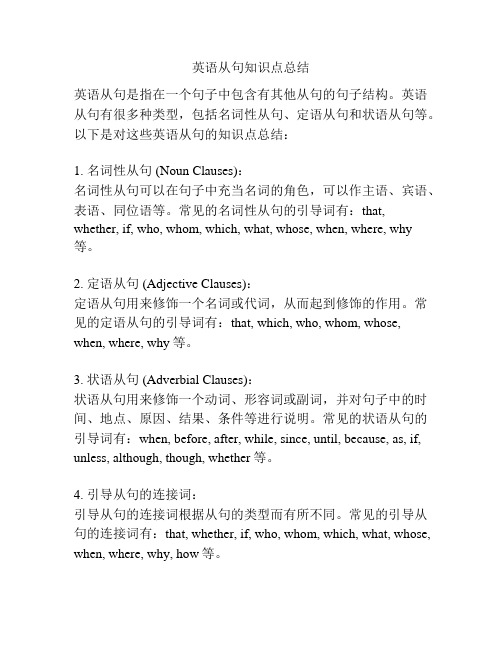
英语从句知识点总结英语从句是指在一个句子中包含有其他从句的句子结构。
英语从句有很多种类型,包括名词性从句、定语从句和状语从句等。
以下是对这些英语从句的知识点总结:1. 名词性从句 (Noun Clauses):名词性从句可以在句子中充当名词的角色,可以作主语、宾语、表语、同位语等。
常见的名词性从句的引导词有:that, whether, if, who, whom, which, what, whose, when, where, why等。
2. 定语从句 (Adjective Clauses):定语从句用来修饰一个名词或代词,从而起到修饰的作用。
常见的定语从句的引导词有:that, which, who, whom, whose, when, where, why等。
3. 状语从句 (Adverbial Clauses):状语从句用来修饰一个动词、形容词或副词,并对句子中的时间、地点、原因、结果、条件等进行说明。
常见的状语从句的引导词有:when, before, after, while, since, until, because, as, if, unless, although, though, whether等。
4. 引导从句的连接词:引导从句的连接词根据从句的类型而有所不同。
常见的引导从句的连接词有:that, whether, if, who, whom, which, what, whose, when, where, why, how等。
5. 从句的位置:从句可以出现在主句前面、中间或后面,具体的位置取决于从句的类型和句子的结构。
6. 省略从句的连接词:在某些情况下,从句的连接词可以省略,只保留从句的其他成分,例如主语、谓语等。
7. 从句的语序:从句的语序与主句的语序有所不同。
在陈述语序中,从句的语序和主句的语序一致;而在疑问语序中,从句的语序要倒装。
以上是英语从句的一些基本知识点总结。
英语八大从句类型例句
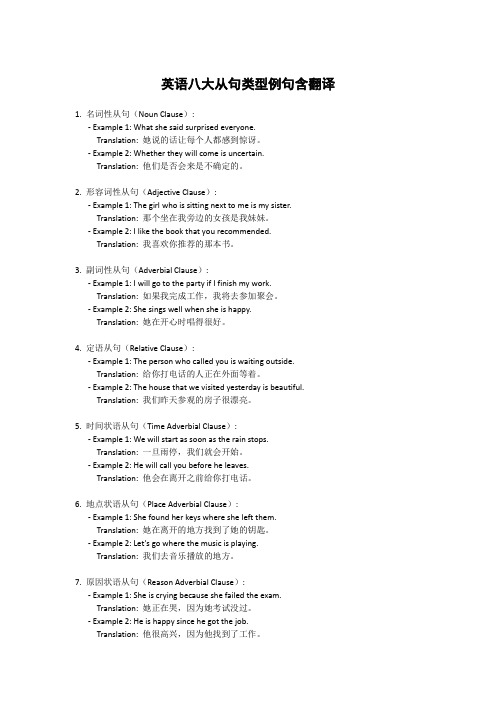
英语八大从句类型例句含翻译1. 名词性从句(Noun Clause):- Example 1: What she said surprised everyone.Translation: 她说的话让每个人都感到惊讶。
- Example 2: Whether they will come is uncertain.Translation: 他们是否会来是不确定的。
2. 形容词性从句(Adjective Clause):- Example 1: The girl who is sitting next to me is my sister.Translation: 那个坐在我旁边的女孩是我妹妹。
- Example 2: I like the book that you recommended.Translation: 我喜欢你推荐的那本书。
3. 副词性从句(Adverbial Clause):- Example 1: I will go to the party if I finish my work.Translation: 如果我完成工作,我将去参加聚会。
- Example 2: She sings well when she is happy.Translation: 她在开心时唱得很好。
4. 定语从句(Relative Clause):- Example 1: The person who called you is waiting outside.Translation: 给你打电话的人正在外面等着。
- Example 2: The house that we visited yesterday is beautiful.Translation: 我们昨天参观的房子很漂亮。
5. 时间状语从句(Time Adverbial Clause):- Example 1: We will start as soon as the rain stops.Translation: 一旦雨停,我们就会开始。
最全英语定语从句总结

最全英语定语从句总结定语从句(Adjective Clause)是用来修饰名词或代词的从句。
下面总结了最全的英语定语从句的用法。
1.关系代词引导定语从句:- 关系代词:who, whom, whose, which, that-关系代词在定语从句中的用法:- who/whom/whose:修饰人- which/that:修饰事物、动物2.常用句型:- 主格定语从句:The person who is standing there is my friend.- 宾格定语从句:The woman whom I talked to is a doctor.- 物主定语从句:The book whose cover is red belongs to me.- 非限制性定语从句:My brother, who lives in London, came to visit me.3.关系代词的选择:- who/that:表示人,可做主语或宾语- whom/that:表示人,只能做宾语- which/that:表示事物或动物,做主语或宾语- whose:表示物或人,表示所有关系4.关系副词引导定语从句:- 关系副词:where, when, why-关系副词在定语从句中的用法:- where:表示地点- when:表示时间- why:表示原因5.非限制性定语从句:-非限制性定语从句用逗号与句子主体隔开,几乎与主句无关,可以省略-非限制性定语从句对句子的主要内容起补充或解释作用- 非限制性定语从句中常用关系代词who, which, that 或者关系副词when6.定语从句省略:- 在定语从句中,如果从句主语和主句的主语相同并且是人称代词,可以省略关系代词who/whom/which/that7.定语从句中的动词形式:-定语从句中的谓语动词根据先行词的人称和数的特点进行变化,但受关系代词引导的从句不存在时态变化总之,定语从句是修饰名词或代词的从句,可以由关系代词或关系副词引导。
英语八大从句类型总结

英语八大从句类型总结There are eight types of subordinate clauses in English grammar, and they are usedto add depth and complexity to sentences. Each type of clause has its own unique function and structure, and understanding them is essential for mastering the English language. In this document, we will provide a comprehensive summary of the eight types of subordinate clauses, including examples and explanations for each.1. Noun Clauses。
Noun clauses function as a noun in a sentence and can act as the subject, object, or complement. They often begin with words such as "that," "whether," or "wh-" words like "who," "what," "where," "when," "why," and "how." For example:I know that she is coming to the party. (noun clause as the object of the verb "know")。
英语中从句类型

英语中从句类型
英语中的从句有以下几种类型:
1. 名词性从句(Noun Clauses):名词性从句在句子中起到名
词的作用,可以作主语、宾语、表语或同位语。
常见的名词性从句
包括宾语从句、主语从句、表语从句和同位语从句。
2. 定语从句(Adjective Clauses):定语从句用来修饰名词
或代词,并且不能独立存在。
通常由关系代词(who, whom, whose, which, that)或关系副词(where, when, why)引导。
3. 状语从句(Adverbial Clauses):状语从句可以表示时间、原因、条件、目的、结果、方式等状语关系。
常见的引导词有连词(while, when, because, if, unless, although, since, etc.)
和疑问词(where, when, why, how, etc.)。
4. 同位语从句(Appositive Clauses):同位语从句用来进一
步解释或说明前面的名词或代词,常由that引导,有时也可以用其
他关系词引导。
5. 感叹句型从句(Exclamatory Clauses):感叹句型从句用
来表示强烈的感情或感叹,通常由what, how, what a引导。
6. 名词化从句(Nominalization Clauses):名词化从句是将
一个完整的句子转化为一个名词,函数如同名词,可以作为主语、
宾语、表语等。
常见的名词化从句有不定式、动名词和现在分词作
为名词的一部分。
这些是英语中常见的从句类型,根据情况的不同,从句的结构和用法会有所变化。
英语语法与写作04-11.1 Adjective clauses (Text)_37

Unit 11Clause: Adjective clauses【GRAMMAR】A clause may be defined as a group of related words with both a subject and a verb. There are two kinds of clauses: main clause and subordinate clause. A main clause (or a simple sentence) contains a complete thought and therefore can stand alone as a sentence. Every sentence must contain at least one main clause (MC).Rain was heavy.Rain would wash away the soil⑥[1 MC]We waited for half an hour.Nothing happened.⑥[2 MC]Winter was coming on.The hills threatened the surrounding villages with destruction.Heavy rain would cause serious floods.⑥[3 MC]A subordinate clause also has a subject and a predicate, but it cannot stand alone to make sense. It needs a main clause to complete its meaning. A subordinate clause is usually introduced by subordinating conjunctions or relative pronouns.He acted.He seemingly had never lived in England before.⑥The sun had set.We returned to our hotel at once.⑥As soon as the sun had set, we returned to our hotel at once.Now he knew it.He would be able to reach the South Pole.The South Pole was 300 miles away.⑥A public house is up for sale.Mr. Thomson bought the house recently.1.Functions and formsAn adjective clause is a sentence clause that modifies a noun or a pronoun as an adjective does. Different from an adjective, an adjective clause starts with an introducer and usually appears after the word it modifies. Both relative pronouns (who, whom, whose, that and which) and the subordinating conjunctions (where, when and why) may be used as introducers to begin adjective clauses. Do remember that introducers play roles in the adjective clauses and relative pronouns replace the noun that the adjective clauses modify.He picked up a long pipe.The pipe was covered with coins.⑥(which = pipe, as a subject of the adjective clause.)He caught sight of a figure.He immediately recognized it.It was our local grocer.⑥(whom = figure, as an object of the adjective clause.)Why did he fail?The reason is still obscure.⑥(why = for which; which = reason; as an adverbial of the clause.)I can not remember the day.At that day, they got engaged.⑥(when = at which; which = day; as an adverbial of the clause.)She forgot the name of the store.At that store, her father bought her an MP4.⑥(where = at which; which = store; as an adverbial of the clause.)2. KindsAdjective clauses can be divided into two kinds: restrictive and nonrestrictive. A restrictive adjective clause gives essential information to define or identify the person or thing we are talking about. It can not be omitted from a sentence. Without the clause, the complete meaning of the sentence would not be expressed clearly. A restrictive adjective clause should not be set off bycommas.A clown is a person.He makes you laugh.A clown is a person who makes you laugh.(Without the clause, “A clown is a person” doesn’t make sense.)Let’s go to a country.In the country, the sun always shines.Let’s go to a country where the sun always shines.(Without the clause, “L et’s go to a country”doesn’t make the meaning of the sentence clear.)When an adjective clause is not absolutely needed in order to express the complete meaning of a sentence, it is called a nonrestrictive adjective clause. The information in this clause is not essential. It tells us more about someone or something, but it does not help us to identify them or it. A nonrestrictive adjective clause can be omitted from a sentence without affecting the basic meaning of the sentence. It should be set off by commas.We were worried about our nearest neighbors.They were newcomers to the district.(As “our nearest neighbors” are clear, the sentence makes sense without the clause.)A brother was lost for a long time.People presumed him to be dead.He was really alive all the time.(As “brother” has a modifier “long-lost”, it is still clear without the clause.)3. Introducers3.1. In restrictive adjective clausesThe following relative pronouns are used to introduce restrictive adjective clauses.Person ThingsSubject who/that which/thatObject whom, who, that/øwhich, that/øPossessive whose whoseThe following subordinating conjunctions are used in restrictive adjective clause.Place Time ReasonAdverbial where when whyNotes:1)who, whom and which can be replaced by that. This is very common in spoken English.2)that can be omitted (ø) when it is the object of the clause.It is one of the ugliest faces (that)I have ever seen.3)whose is used for things as well as for people.The man whose bike was stolen called the local police.The car whose window has been broken is my neighbors.4)whom is very formal and is only used in written English. In spoken English, that is usuallyreplaced by who/that, or nothing (ø).5)that is usually used after the words like something, anything, everything, nothing, all andsuperlatives.There is something that we will never forget.That was the most exciting news that I have ever heard.3.2 In nonrestrictive adjective clausesThe following relative pronouns are used to introduce nonrestrictive adjective clauses.Person ThingsSubject who whichObject whom, who,whichPossessive whose whoseThe following subordinating conjunctions are used in nonrestrictive adjective clauses.Place Time ReasonAdverbial where when whyNotes:1)We always use commas to separate a nonrestrictive adjective clause from the rest of thesentence.2)In nonrestrictive adjective clauses, we never use “that” to replace .3)We never omit the relative pronoun, even when it is the object of the verb in the adjectiveclause.4)In spoken English, we usually put the preposition in nonrestrictive adjective clauses at theend of the clause; whereas, in written or formal English, we put the preposition before the pronoun.Last summer we visited the West Lake, for which Hangzhou is famous in the world. [in written English]This machine, which I have looked after for many years, is still working perfectly. [in spoken English]。
adjective clauses(print)
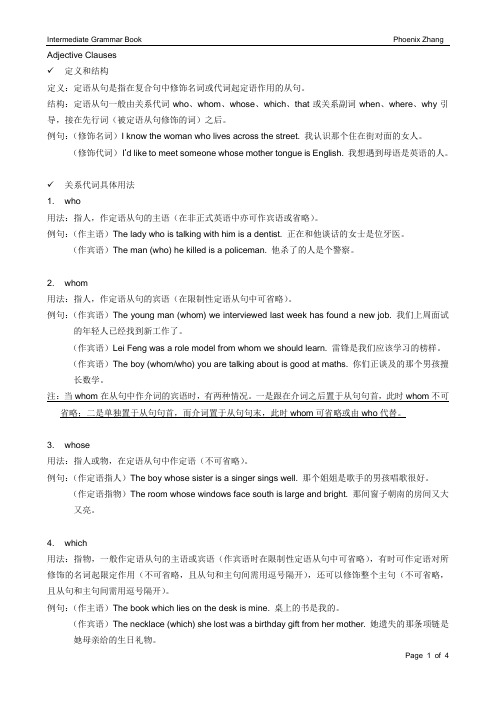
Adjective Clauses✓定义和结构定义:定语从句是指在复合句中修饰名词或代词起定语作用的从句。
结构:定语从句一般由关系代词who、whom、whose、which、that或关系副词when、where、why引导,接在先行词(被定语从句修饰的词)之后。
例句:(修饰名词)I know the woman who lives across the street. 我认识那个住在街对面的女人。
(修饰代词)I’d like to meet someone whose mother tongue is English. 我想遇到母语是英语的人。
✓关系代词具体用法1. who用法:指人,作定语从句的主语(在非正式英语中亦可作宾语或省略)。
例句:(作主语)The lady who is talking with him is a dentist. 正在和他谈话的女士是位牙医。
(作宾语)The man (who) he killed is a policeman. 他杀了的人是个警察。
2. whom用法:指人,作定语从句的宾语(在限制性定语从句中可省略)。
例句:(作宾语)The young man (whom) we interviewed last week has found a new job. 我们上周面试的年轻人已经找到新工作了。
(作宾语)Lei Feng was a role model from whom we should learn. 雷锋是我们应该学习的榜样。
(作宾语)The boy (whom/who) you are talking about is good at maths. 你们正谈及的那个男孩擅长数学。
注:当whom在从句中作介词的宾语时,有两种情况。
一是跟在介词之后置于从句句首,此时whom不可省略;二是单独置于从句句首,而介词置于从句句末,此时whom可省略或由who代替。
英语补足语从句

英语补足语从句英语中的补足语从句(complement clauses)通常用来补充、描述或解释主句中的名词、形容词或动词。
下面是一些常见的补足语从句的类型和示例:1. 名词性从句(Noun Clauses):作为主句中名词的补充,充当主语、宾语或介词的宾语。
- I believe that he will come.(我相信他会来。
)(作为主语) - She doesn't know what to do next.(她不知道下一步该怎么办。
)(作为宾语)- We talked about where to go for vacation.(我们讨论了去哪里度假。
)(作为介词的宾语)2. 形容词性从句(Adjective Clauses):用来修饰主句中的名词或代词,并且通常由关系词引导。
- I read a book that is really interesting.(我读了一本非常有趣的书。
)- The woman who is sitting over there is my aunt.(坐在那边的女人是我姑姑。
)3. 副词性从句(Adverb Clauses):用来修饰主句中的动词、形容词或副词,并且通常由连词引导。
- She smiled when she saw her friend.(她看到她的朋友时笑了。
)(修饰动词)- He is as tall as I thought he would be.(他和我想象的一样高。
)(修饰形容词)- They played basketball so skillfully that they won the game.(他们打得太娴熟了,以至于赢得了比赛。
)(修饰副词)值得注意的是,补足语从句的引导词会根据它在句中的角色和关系来选择不同的词,例如:that, whether, if, who, whom, whose, which, what, where, when, why, how 等。
从句语法 英语语法

从句语法英语语法从句是一个包含主语和谓语的句子,但它不能独立成为一个完整的句子,而是需要依附于主句。
从句通常用于给予额外信息、描述或补充主句中的内容。
在英语语法中,从句分为几种类型,主要有名词性从句、形容词性从句和副词性从句。
1.名词性从句(Noun Clauses):•作用:在句子中充当名词的角色,可以用作主语、宾语、或介词的宾语。
•例子:•主语从句:What he said is important.(他说的话很重要。
)•宾语从句:I know that you are busy.(我知道你很忙。
)•介词宾语从句:I am interested in what you do.(我对你做的事情感兴趣。
)2.形容词性从句(Adjective Clauses):•作用:对主句中的名词或代词进行修饰,提供更多的信息。
•例子:•The book which is on the table is mine.(在桌子上的那本书是我的。
)•She is the girl who helped me yesterday.(她是昨天帮助我的那个女孩。
)3.副词性从句(Adverbial Clauses):•作用:在句子中充当副词,修饰动词,形容词或副词。
•例子:•When the rain stops, we will go out.(雨停的时候,我们会出去。
)•He works hard so that he can succeed.(他努力工作以便成功。
)需要注意的是,从句的引导词(关联词)在不同类型的从句中有所不同。
例如,名词性从句的引导词包括that、whether、if、what 等;形容词性从句的引导词包括who、which、whose、whom、that 等;副词性从句的引导词包括when、while、since、if、because 等。
正确使用从句是提高英语语法水平的关键之一,因此建议通过大量阅读和实际运用来熟练掌握不同类型从句的用法。
九种英语主语从句

九种英语主语从句英语中,主语从句是一种非常常见的从句结构。
它可以用作句子的主语,起到引出或说明整个句子的作用。
以下是九种常见的英语主语从句的类型及示例:1. 名词从句(Noun Clauses):名词从句作为主语,用于引出或说明某个事物或情况的真相、原因、目的等。
示例:- What he said is true.(他说的是对的。
)2. 代词从句(Pronoun Clauses):代词从句用一个代词作为主语,描述或说明某人或某事。
示例:- It's important that we finish the project on time.(我们按时完成项目非常重要。
)- Whoever wants to join the club can sign up here.(想加入俱乐部的人可以在这里报名。
)3. 形容词从句(Adjective Clauses):形容词从句用于修饰某个名词,作为主语起到描述或说明的作用。
示例:- What you just said is not relevant.(你刚才说的不相关。
)- Where he was born has always been a mystery.(他出生在哪里一直是个谜。
)4. 副词从句(Adverb Clauses):副词从句用于描述或说明一个动作或状态的条件、原因、时间、地点等。
示例:- When he arrives, we can start the meeting.(他一到,我们就可以开始会议。
)- If you study hard, you will pass the exam.(如果你努力研究,你会通过考试。
)5. 不定式从句(Infinitive Clauses):不定式从句用于说明一个动作的目的、结果等。
示例:- To win the game is our ultimate goal.(赢得比赛是我们的终极目标。
Adjective clause 定语从句及 TYPES OF SENTENCES

• It can join an independent clause (simple sentence) to become a… • Complex sentence!
Subordinating Conjunctions(从属连词)
Translation
1. Tourism can _______________________ and it can keep the customs and beauty of the local place.
旅游业改善当地居民的福利,同时保护了当地的风俗和美景。 1. improve the well-being of local inhabitants 2. Sending children to study in _______________________ is a good idea but it is a luxury to many families. 把小孩送到寀宿学校是个好主意,但是对于许多家庭而言它是个奢侈的梦想. 2. a boarding school 3. _________________________________________ modern education, so some optimistic people claim that our children no longer need to go to the traditional school to receive formal education. 远程教育在现代教育中起到日益重要的作用,于是有些乐观的人声称我们的孩子 不必去传统的学校接受正规教育。 3.Distance education has been playing an increasingly important role in
通用的作文英语从句表达

通用的作文英语从句表达1. 定语从句 (Adjective Clauses):The book that I borrowed from the library was very interesting.She lives in the house which is located near the park.The man who is sitting over there is my teacher.2. 副词从句 (Adverb Clauses):He will go to bed early if he finishes his homework.She always studies hard so that she can get good grades.I will go for a walk when it stops raining.3. 名词性从句 (Noun Clauses):What he said surprised me a lot.I don't know where she lives.He asked me whether I wanted to go with him.4. 非限制性定语从句 (Non-Restrictive Relative Clauses):My sister, who is a doctor, lives in New York.The Taj Mahal, which is located in India, is a famous tourist attraction.John, whose father is a famous actor, won the competition.5. 条件状语从句 (Conditional Adverb Clauses):If it rains tomorrow, we will stay indoors.I will buy a car provided that I can afford it.Unless you finish your work, you cannot go out to play.6. 时间状语从句 (Temporal Adverb Clauses):We will go to the beach after we finish our exams.Before you leave, please turn off the lights.While she was cooking, she listened to music.7. 原因状语从句 (Causal Adverb Clauses):He failed the exam because he didn't study hard.Since it's raining, we should take an umbrella.She couldn't attend the party as she was feeling unwell.8. 方式状语从句 (Manner Adverb Clauses):He sings as if he were a professional singer.She walked home as though she were in a hurry.He works hard as long as he enjoys what he's doing.以上是一些常用的从句表达方式,通过灵活运用这些从句,你可以使你的文章更加生动有趣,语言表达也更加丰富多彩。
定语从句 adjective clause

Adjective Clause
• Must be placed next to the word it modifies to keep the meaning clear.
– The swimming pool in our town, which was built in 1950, was renovated last summer.
a man of understanding is of a calm spirit. 4. Better is the poor who walks in his integrity
than one who is perverse in his lips, and is a fool. 5. Wisdom is a fountain of life that sustains us.
– This is the town where I grew up. – This is the time when we serve coffee. – You are the reason why I come home.
Adjective Clause
– Newsworthy events rarely happen in the small town where I lived as a child.
Choose the correct relative adverb.
• is the station ___Emily met James.
• July and August are the months ___most people go on holiday.
• Do you know the reason ___ so many people in the world learn English?
英语中五大从句
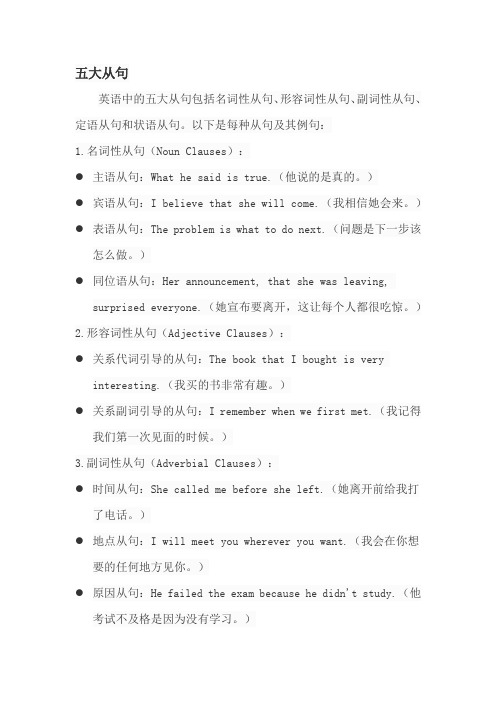
五大从句英语中的五大从句包括名词性从句、形容词性从句、副词性从句、定语从句和状语从句。
以下是每种从句及其例句:1.名词性从句(Noun Clauses):●主语从句:What he said is true.(他说的是真的。
)●宾语从句:I believe that she will come.(我相信她会来。
)●表语从句:The problem is what to do next.(问题是下一步该怎么做。
)●同位语从句:Her announcement, that she was leaving,surprised everyone.(她宣布要离开,这让每个人都很吃惊。
)2.形容词性从句(Adjective Clauses):●关系代词引导的从句:The book that I bought is veryinteresting.(我买的书非常有趣。
)●关系副词引导的从句:I remember when we first met.(我记得我们第一次见面的时候。
)3.副词性从句(Adverbial Clauses):●时间从句:She called me before she left.(她离开前给我打了电话。
)●地点从句:I will meet you wherever you want.(我会在你想要的任何地方见你。
)●原因从句:He failed the exam because he didn't study.(他考试不及格是因为没有学习。
)●条件从句:If it rains, we will stay indoors.(如果下雨,我们将呆在室内。
)●结果从句:He worked hard, so he succeeded.(他努力工作,所以成功了。
)4.定语从句(Adjective Clauses):●关系代词引导的从句:The man who is talking to my mother ismy uncle.(正在和我妈妈交谈的那个人是我叔叔。
adjective clause例句
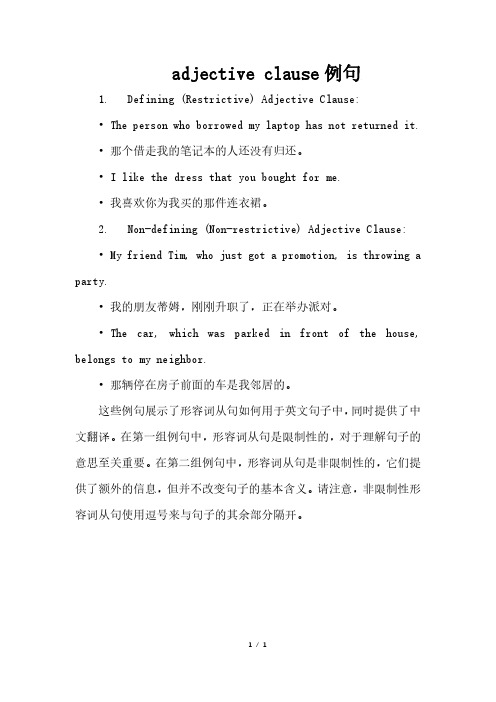
adjective clause例句
1. Defining (Restrictive) Adjective Clause:
• The person who borrowed my laptop has not returned it.
•那个借走我的笔记本的人还没有归还。
• I like the dress that you bought for me.
•我喜欢你为我买的那件连衣裙。
2. Non-defining (Non-restrictive) Adjective Clause:
• My friend Tim, who just got a promotion, is throwing a party.
•我的朋友蒂姆,刚刚升职了,正在举办派对。
• The car, which was parked in front of the house, belongs to my neighbor.
•那辆停在房子前面的车是我邻居的。
这些例句展示了形容词从句如何用于英文句子中,同时提供了中文翻译。
在第一组例句中,形容词从句是限制性的,对于理解句子的意思至关重要。
在第二组例句中,形容词从句是非限制性的,它们提供了额外的信息,但并不改变句子的基本含义。
请注意,非限制性形容词从句使用逗号来与句子的其余部分隔开。
1/ 1。
语法中的从句用法与实例解析

语法中的从句用法与实例解析语法中的从句是指可以独立构成句子的一种句子结构,它通常包含一个主句和一个或多个从句。
从句在句子中充当不同的语法成分,可以起到修饰、补充、说明等作用。
下面将从主要的从句类型进行解析并提供实例。
1. 定语从句(Adjective Clause)定语从句用来修饰名词或代词,通常在句子中起到形容、限定或说明作用。
它用来对先行词进行进一步描述。
例如:The book that I borrowed from the library is very interesting.从句:"that I borrowed from the library"先行词:"the book"2. 状语从句(Adverbial Clause)状语从句用来修饰主句的动词、形容词或副词,并提供时间、地点、原因、目的等信息。
例如:She will come back when she finishes her work.从句:"when she finishes her work"修饰动词 "come back",提供时间信息。
3. 名词性从句(Noun Clause)名词性从句可以在句子中充当主语、宾语或表语,并起到名词的作用。
例如:What he said made me happy.从句:"What he said"充当宾语的作用,代替真实的宾语。
4. 转折语从句(Concessive Clause)转折语从句用来表示对比、转折或让步的关系,常常由连词"though"或"although"引导。
例如:Although it was raining, they still went hiking.从句:"Although it was raining"表示尽管下雨,但仍然出去远足。
英语中的从句种类

英语中的从句种类在英语中,从句可以根据其引导词的不同进行分类。
主要的从句种类包括:名词性从句(Nominal Clauses):这些从句在句子中起到名词的作用,可以担任主语、宾语、表语或同位语。
它们包括:主语从句(Subject Clauses)宾语从句(Object Clauses)表语从句(Predicative Clauses)同位语从句(Appositive Clauses)定语性从句(Adjective Clauses):这些从句在句子中起到形容词的作用,用以修饰名词或代词。
它们包括:限定性定语从句(Restrictive Adjective Clauses)非限定性定语从句(Non-restrictive Adjective Clauses)状语性从句(Adverbial Clauses):这些从句在句子中起到副词的作用,用以修饰动词、形容词或整个句子。
它们包括:时间状语从句(Adverbial Clauses of Time)地点状语从句(Adverbial Clauses of Place)原因状语从句(Adverbial Clauses of Reason)条件状语从句(Adverbial Clauses of Condition)让步状语从句(Adverbial Clauses of Concession)目的状语从句(Adverbial Clauses of Purpose)结果状语从句(Adverbial Clauses of Result)特殊疑问词引导的从句:这些从句由特殊疑问词引导,用于对特定内容进行询问。
它们包括:由who, whom引导的表示人的名词性从句由what引导的表示事物或抽象概念的名词性从句由which引导的选择性名词性从句由whose引导的表示所属关系的名词性从句由where引导的表示地点的名词性从句由when引导的时间名词性从句由why引导的原因名词性从句由how引导的方式、方法名词性从句由whether引导的“是否”名词性从句。
adjective clause

For example : Is there anything (that) I can do for you .
The guide word (the relative )
who whom sb.
The relative pronoun
whose as that which
sb. or sth.
B 非限制性定语从句(Non-defining Attributive Clause)和主句关系不很密切,只是对先行词作些附 加说明, 如果去掉,主句的意思仍然清楚。这种从 句, 写时往往逗号分开。
The boys who are playing football are from Class four.
The attribute
The antecedent
The guide word (the relative )
The classification
Some special points
The attribute
Definition: A word used to modify or define or explain the quality and feature of something Three little boys Whose pen is it ? There is nothing to worry about . The lady in black is our teacher .
3.先行词被the only, the very, the same, the last修饰时 This is the very book that belongs to him.
4.先行词是who或who引导的主句 Who is the girl that drove the car? Who that broke the window will be punished.
Adjective Clause

Adjective Clause除了用单词或短语来形容名词外,还可以用从句来形容,那些从句称为「形容词从句」Adjective Clause;而被形容的名词,称为「先行词」Antecedent。
例如:We need fearless men.﹝单词形容"men"﹞We need men without fear.﹝短语形容"men"﹞We need men who are fearless.﹝从句形容"men"﹞把形容词从句附属到主句身上的词有三种:(1)关系代名词Relative Pronoun(2)关系形容词Relative Adjective(3)关系副词Relative Adverb1.关系代名词Relative Pronoun有:(1) who﹝代人﹞;(2) whom﹝代人﹞;(3) which﹝代物﹞;(4) that﹝代人或物﹞;(5) as﹝代人或物﹞例如:The two men who are in that house are my uncles.*关系代名词"who"的身和数由先行词"men"决定。
This is the man who showed me the way.There is somebody who wants you on the telephone.﹝有人想你接听电话。
﹞*在"there is"结构后面的形容词从句,当主语的"who"可隐藏,即:There is somebody wants you on the telephone.The girl whom you saw is her sister-in-law.*当关系代名词在形容词从句中作宾语时,可隐藏,即:The girl you saw is her sister-in-law.Whom do you mean?或Who do you mean?I know the man whom you mean.或I know the man who you mean.﹝我认识你所意指的那个人。
- 1、下载文档前请自行甄别文档内容的完整性,平台不提供额外的编辑、内容补充、找答案等附加服务。
- 2、"仅部分预览"的文档,不可在线预览部分如存在完整性等问题,可反馈申请退款(可完整预览的文档不适用该条件!)。
- 3、如文档侵犯您的权益,请联系客服反馈,我们会尽快为您处理(人工客服工作时间:9:00-18:30)。
In (g): The symbol “Ѳ” means “nothing goes here.”
USING WHICH AND THAT IN ADJECTIVE CLAUSES
s v (a) The river is polluted. It flows through the town. ↓ which/that s v (b) The river which flows through the town is polluted. © The river that flows through the town is polluted. Who and whom refer to people. Which refers to things. That refers to either people or things. In (a): To make an adjective clause, change it to which or that. It, which, and that all refer to a thing (the river). (b) and ©have the same meaning. When which and that are used as the subject of an adjective clause, they CANNOT be omitted. Incorrect:The river flows through town is polluted.
s v o (d) The man was friendly. I me him.
↓ o s v whom/that (e) The man who(m) I met was friendly. (f) The man that I met was friendly. (g) The man Ѳ I met was friendly.
In addition to whom(m), *that clause can be used as the object is an adjective clause. (e) and (f) have the same meaning.
An object pronoun can be omitted from an adjective clause. (e), (f) and (g) have the same meaning.
s v o ©The man was friendly. I met him. ↓ whom o s v whom I met. (d) The man whom I met was friendly. In © him is an object pronoun. Him refers to “the man”. : To make an adjective clause, change him to whom. Whom is an object pronoun. Whom refers to “the man.” Whom comes at the beginning of an adjective clause.
ADJECTIVE CLAUSE
ቤተ መጻሕፍቲ ባይዱ
ADJECTIVE CLAUSES: INTRODUCTION
ADJECTIVES An adjectives modifies a noun. “Modify” means to change a little. An adjective describes or gives information about the noun. Adjective usually comes in front of a noun. (a) I met a kind man adjective +noun (b) I met a famous man ADJECTIVE CLAUSES An adjective clause* modifies a noun. It describes or gives information about a noun. An adjective clause follow a noun ©I met a man who is kind to everybody. (d) I met a man who is a famous poet. (e) I met a man who lives in Chicago. noun + adjective clause
In (d): An adjective clause immediately follow the noun it modifies. Incorrect:The man was friendly whom I met.
USING WHO, WHO(M), AND THAT IN ADJECTIVE CLAUSES
USING WHO AND WHOM IN ADJECTIVE CLAUSES
S V (a) The man is friendly. He lives next to me. ↓ who who lives next to me. (b) The man who lives next to me is friendly. In (a): He is a subject pronoun. He refers to “the man.” To make an adjective clause, change he to who. Who is a subject pronoun. Who refers to “the man.” In (b): An adjective clause immediately follow the noun it modifies. Incorrect:The man is friendly who lives next to me.
*grammar terminology
A clause is a structure that has a subject and a verb. There is two kinds of clauses: independent and dependent. - An independent clause is a main clause and can stand alone as a sentence. - A dependent clause cannot stand alone as a sentences; it must be connected to an independent clause. (1) I met a man = an independent clause; it is a complete sentence. (2) He lives in Chicago = a dependent clause; it is NOT a complete sentence. (3) who lives in Chicago = a dependent clause; it is NOT a complete sentence. (4) I met a man who lives in Chicago = an independent clause + a dependent clause; a complete sentence.
(f) The chair is hard. I am sitting obj. prep (g) The chair which I am sitting in (h) The chair that I am sitting in (i) The chair
prep obj. to him.
Ѳ I talked to was helpful. prep obj. (e) The man to whom I talked was helpful. Whom , which, and that can be used as the object of a preposition in an adjective clause. Reminder: An object pronoun can be omitted from an adjective clause, as in (d) and (i). In very formal English, a preposition comes at the beginning of an adjective clause, as in (e) and (j). The preposition is followed by either whom or which (not that or who), and the pronoun CANNOT be omitted. (b), © (d), and (e) have the same meaning. , (d) The man
USING PREPOSITIONS IN ADJECTIVE CLAUSES
